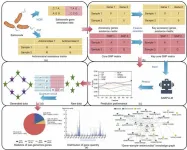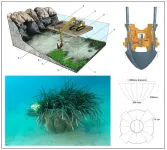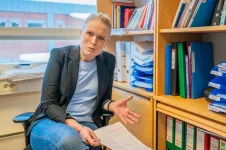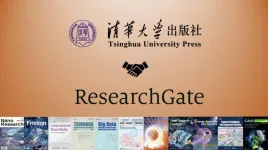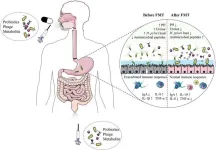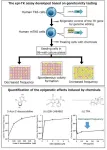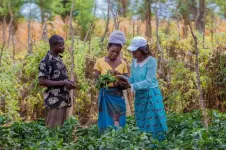(Press-News.org) April 10, 2025, ONTARIO — A yearlong campaign from the Ontario Institute for Cancer Research (OICR) is celebrating the profound difference cancer research is making in the lives of Ontarians.
Cancer Research Changed My Life showcases the people behind research discoveries, bringing their personal stories to life through videos and first-person testimonials.
As the province’s cancer research institute, OICR brings together a community of scientists, cancer patients, clinicians and everyday Ontarians to solve cancer together. With Cancer Research Changed My Life, OICR is shining a spotlight on that community and what it has achieved.
“Cancer research is about more than just hope. It is about using scientific insights to make a tangible difference in people’s lives every day.” says Dr. Christine Williams, Acting President of OICR. “The stories featured in this campaign are a testament to the impact of research and its potential to transform the future of cancer.”
Cancer Research Changed My Life has featured several powerful stories to date, including:
“Without cancer research, I would not have a life to be talking about right now.” — Carla
See Carla’s full story
“Cancer research gave my father an extra year of life, and the memories we made that year will live with my family forever.” — Ambuj
See Ambuj’s full story
“To see a drug that I helped discover have a real impact on patients facing this dreadful disease is the thrill of a lifetime.” — David
See David’s full story
The campaign will continue for the rest of 2025, with new stories published throughout the year. OICR is encouraging people to join in the campaign on social media by sharing their own stories about cancer research using the hashtag #ChangedMyLife
This year also marks OICR’s 20th anniversary.
“Decades of research have led to significant advances in our understanding of how cancer develops and evolves, and therefore how we can prevent, diagnose and treat patients,” says Dr. Lincoln Stein, Acting Scientific Director of OICR. “With support from the Ontario government and our partners across the province, we’ll continue our work help cancer research change even more lives in the future.”
“Ontario-made research is saving lives every day,” says Nolan Quinn, Minister of Colleges, Universities, Research Excellence and Security. “Our government is proud to support the Ontario Institute for Cancer Research with over half a billion dollars in funding since 2018 so that they can continue changing the future of cancer treatment in our province today, and into the future.”
To see more about how cancer research is changing lives, visit changedmylife.oicr.on.ca and follow OICR on Instagram, YouTube, LinkedIn and Bluesky.
…
OICR is funded by the Government of Ontario. As the province’s cancer research institute, we take on the biggest challenges in cancer research and deliver real-world solutions to find cancer earlier and treat it more effectively. We are committed to helping people living with cancer, as well as future generations, live longer and healthier lives. For more information visit http://www.oicr.on.ca.
The views expressed are those of OICR and do not necessarily reflect the views of the Province of Ontario.
END
Cancer Research Changed My Life campaign shows personal impact of scientific discoveries
2025-04-10
ELSE PRESS RELEASES FROM THIS DATE:
AERA announces 2025 award winners in education research
2025-04-10
Washington, April 10, 2025—The American Educational Research Association (AERA) has announced the winners of its 2025 awards for excellence in education research.
“We are pleased to present the 2025 awards to this commendable and exemplary group of education scholars and champions,” said AERA Executive Director Felice J. Levine. “They have contributed tremendously to education research, across all career stages and fields, and continue to make a difference in the lives of students and educators.”
AERA will honor the recipients at the Awards Ceremony Luncheon at the 2025 Annual Meeting in Denver on ...
New platform leverages AI and quantum computing to predict salmonella antimicrobial resistance
2025-04-10
A recent study published in Engineering presents a novel approach to predict Salmonella antimicrobial resistance, a growing concern for public health. The research, led by Le Zhang from Sichuan University, combines large language models (LLMs) and quantum computing to develop a predictive platform.
Salmonella is a common foodborne pathogen. The overuse of antimicrobials and genetic mutations have led to the rise of antimicrobial-resistant Salmonella strains, making it crucial to predict resistance accurately for effective treatment. However, traditional methods like bacterial antimicrobial susceptibility tests (ASTs) are inefficient, ...
Transplanting Posidonia oceanica: a major scientific advance for the conservation of seagrass meadows
2025-04-10
A study has resulted in the transplantation of 384 m² of Posidonia oceanica seagrass on the scale of an industrial project as part of maritime works in Monaco. This success challenges the idea that these ecosystems are "non-transplantable". This unprecedented experiment, conducted over a period of eight years, opens up new prospects for the preservation of seagrass meadows threatened by coastal urbanisation.
As part of the construction project for the "Mareterra" district in Monaco, the marine works involved the destruction of several hectares of Posidonia oceanica meadows, an underwater plant essential to the Mediterranean ...
Patients' experience of healthcare should be a greater part of assessing quality
2025-04-10
Everyone wants good quality healthcare, but what exactly is quality and how do you measure it?
Is it to do with the waiting time for home care services? Or how many nursing home residents have had medical supervision in the past year? Or whether the medication lists have been checked recently?
“These are important aspects that are all worth monitoring. The problem is that quality cannot be easily reduced to a quantifiable value,”said Randi Olsson Haave, an assistant professor and PhD research fellow at the Norwegian University of Science ...
Tsinghua University Press and ResearchGate expand Journal Home partnership
2025-04-10
Beijing (China) and Berlin (Germany) April 10, 2025 - Tsinghua University Press (TUP), the leading university press in China, and ResearchGate, the professional network for researchers, has announced an expansion of its Journal Home partnership, which was the first of its kind with a Chinese publisher last year. This expansion more than doubles TUP’s coverage, now including 11 open access titles.
Since 1980, TUP has maintained a strong presence in China’s higher education, science, and technology sectors. The expanded partnership will increase the visibility of 10,000+ research articles, spanning nano research, AI, computing, ...
Therapy-related b-lymphoblastic leukemia following treatment for multiple myeloma with unusual surface light chain expression: a case report
2025-04-10
Background
Therapy-related B-lymphoblastic leukemia (B-ALL) following treatment for multiple myeloma is a rare occurrence. Despite its rarity and the lack of recognition by the World Health Organization as a distinct disease entity, previous publications indicate its possible emergence following myeloma treatment.
Case presentation
The patient is a 65-year-old gentleman with a history of IgG kappa multiple myeloma, status post multiple lines of therapy. The patient presented with a fever, and a complete blood count showed cytopenia. Bone marrow morphologic evaluation revealed numerous blasts. ...
Poo-romising frontier in fecal microbiota transplantation
2025-04-10
Helicobacter pylori (H. pylori) is a widespread bacterial infection associated with gastritis, peptic ulcers, and gastric cancer. While conventional antibiotic-based treatments have been the gold standard for eradication, their efficacy has been steadily declining due to the alarming rise in antibiotic resistance. This has spurred interest in alternative therapies, one of which is fecal microbiota transplantation (FMT).
FMT is a novel therapeutic approach that involves transferring microbiota from a healthy donor to a patient’s ...
A new approach to differentiating large granular lymphocytic leukemias and their mimics in light of current updates in the 5th Edition of the WHO Classification
2025-04-10
Large granular lymphocytic leukemias (LGLLs) are a heterogeneous group of rare chronic lymphoproliferative disorders characterized by the clonal proliferation of cytotoxic lymphocytes. Among them, T-cell LGLL (T-LGLL) and NK-cell LGLL (NK-LGLL) are the most prominent. Due to overlapping morphological, clinical, and immunophenotypic characteristics, distinguishing these disorders from related entities such as T-prolymphocytic leukemia (T-PLL), adult T-cell leukemia/lymphoma (ATLL), Sézary syndrome (SS), and aggressive NK-cell leukemia (ANKL) presents a significant diagnostic challenge. This review integrates recent molecular insights and updates from the WHO 5th edition ...
Simple and cost-effective reporter assay for evaluating chemical-induced epigenetic changes
2025-04-10
Chemicals used as food preservatives, flavoring agents, dyes, pesticides, cosmetics, cleaners, and other industrial materials are being increasingly recognized as a health hazard. Their rampant use has led to an increase in the prevalence of various chemical toxicity-induced diseases, including hormonal disruption, cancer, neurological disorders, skin conditions, and occupational poisoning. Numerous chemicals are known to trigger “carcinogenesis” or cancer development by exerting genotoxic effects (direct or indirect interference with DNA replication and damage repair processes ...
Scientists say the “plant world” needs to come out and claim its place at the One Health table
2025-04-10
Scientists writing a policy forum article in the CABI One Health journal say the “plant world” needs to come out and claim its place at the One Health table as part of a desire to break down barriers that currently limit true cross-domain integration.
The researchers say that while plant health is increasingly recognized as a vital part of One Health, it lacks recognition and – historically focussed on health service provision, zoonotic diseases and antimicrobial resistance – One Health overlooks plant health in strategic plans.
They add that cross-sectoral approaches, core to One Health, are already used ...
